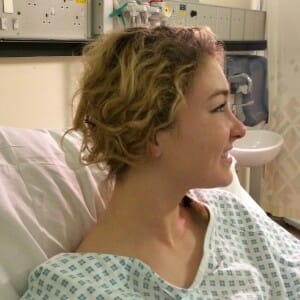
I was out on a 5k run when suddenly my heart started beating several times faster than it should have been. I stopped, sat down, breathed deeply, but nothing would stop it. I was in the middle of a wood when it happened, exactly halfway through the run and so about 2.5k away from home. After about 10 minutes of resting, I made my way home, but even 20 minutes later when I got there my heart hadn’t stopped racing. My housemate told me to call 111; they told me to call 999. I was rushed to hospital, but no one could find anything wrong with me – by the time the ambulance got to my house, the palpitations had stopped. But they had been ongoing for about 40 minutes.
That sparked a whole series of hospital trips, ECGs and even an echo, all through my final year of university, when my dissertation was due and finals were looming. Two days before my Latin exam and a week before I had to move to London for a new job I was finally diagnosed with Wolff-Parkinson-White syndrome. My treatment was moved to London and there followed several more ECGs and hospital trips. During this time, I was very grateful for the support of CRY.
I was told that my condition was relatively mild, but would have to be dealt with. I had two options: to be on beta blockers for the rest of my life, which would keep me safe from the risk of further heart attacks, but would mean I could never run in the same way again. The second option was a catheter ablation, where they would simply cauterise the extra electrical signal in my heart that was causing all the palpitations. Keen to fix the problem, and keen to get back into training, I opted for the ablation. The cardiologists explained to me the minimal risks of the operation, and reassured me that they thought the extra signal was on the other side of my heart from the normal electrical centre, so the risks of damage to my heart’s normal functions was even more minimal.
I waited a few months for the operation date, but it finally arrived, and I made sure that I went to my favourite comedian’s show the night before, so that I was fully relaxed (for any other comedy fans out there, it was James Acaster – he really is incredible!).
 I ended up being in surgery for three hours, as they opened arteries in my groin to insert the catheter tubes that would lead to my heart. They then set off my palpitations, so that they could identify where exactly the extra electrical signal was (which, to be perfectly honest, was terrifying!). After an hour the surgeon came and told me that it was exactly where they thought it was, and they would ablate it. I was given a few extra doses of morphine, and after another hour or so (I lost track of time…) my heart was completely normal. They kept me in hospital for a further three hours, just for observation, so that they could be sure the bleeding in my groin had stopped.
I ended up being in surgery for three hours, as they opened arteries in my groin to insert the catheter tubes that would lead to my heart. They then set off my palpitations, so that they could identify where exactly the extra electrical signal was (which, to be perfectly honest, was terrifying!). After an hour the surgeon came and told me that it was exactly where they thought it was, and they would ablate it. I was given a few extra doses of morphine, and after another hour or so (I lost track of time…) my heart was completely normal. They kept me in hospital for a further three hours, just for observation, so that they could be sure the bleeding in my groin had stopped.
I was very lucky to have the support of my mother, my friends, and my boyfriend all the way through the procedure. I was completely overwhelmed by the number of supportive messages I received, and the amount of cake that I was brought!
If I could draw a top three tips from my experience for anyone else going through the same thing, I would say:
- Don’t worry too much. The risks are minimal. Stay positive, and trust the doctors – they will take very good care of you.
- Equally, don’t downplay it too much. As much for my own peace of mind as for others, I dismissed the operation as nothing serious. It is serious. It is scary. Make sure you have a loved one with you.
- Accept the sedative they offer you! Trust me, you will need it.
Watch her video below of how she felt before and after her ablation.